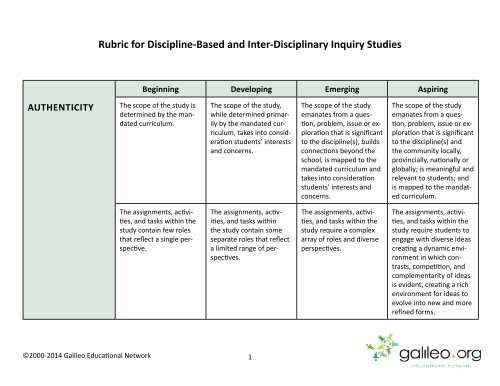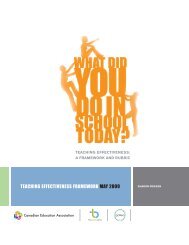Inquiry Rubric - Galileo Educational Network
Inquiry Rubric - Galileo Educational Network
Inquiry Rubric - Galileo Educational Network
Create successful ePaper yourself
Turn your PDF publications into a flip-book with our unique Google optimized e-Paper software.
<strong>Rubric</strong> for Discipline-Based and Inter-Disciplinary <strong>Inquiry</strong> Studies<br />
Beginning Developing Emerging Aspiring<br />
AUTHENTICITY<br />
The scope of the study is<br />
determined by the mandated<br />
curriculum.<br />
The scope of the study,<br />
while determined primarily<br />
by the mandated curriculum,<br />
takes into consideration<br />
students’ interests<br />
and concerns.<br />
The scope of the study<br />
emanates from a question,<br />
problem, issue or exploration<br />
that is significant<br />
to the discipline(s), builds<br />
connections beyond the<br />
school, is mapped to the<br />
mandated curriculum and<br />
takes into consideration<br />
students’ interests and<br />
concerns.<br />
The scope of the study<br />
emanates from a question,<br />
problem, issue or exploration<br />
that is significant<br />
to the discipline(s) and<br />
the community locally,<br />
provincially, nationally or<br />
globally; is meaningful and<br />
relevant to students; and<br />
is mapped to the mandated<br />
curriculum.<br />
The assignments, activities,<br />
and tasks within the<br />
study contain few roles<br />
that reflect a single perspective.<br />
The assignments, activities,<br />
and tasks within<br />
the study contain some<br />
separate roles that reflect<br />
a limited range of perspectives.<br />
The assignments, activities,<br />
and tasks within the<br />
study require a complex<br />
array of roles and diverse<br />
perspectives.<br />
The assignments, activities,<br />
and tasks within the<br />
study require students to<br />
engage with diverse ideas<br />
creating a dynamic environment<br />
in which contrasts,<br />
competition, and<br />
complementarity of ideas<br />
is evident, creating a rich<br />
environment for ideas to<br />
evolve into new and more<br />
refined forms.<br />
©2000-2014 <strong>Galileo</strong> <strong>Educational</strong> <strong>Network</strong> 1
Beginning Developing Emerging Aspiring<br />
ACADEMIC RIGOR<br />
The assignments, activities,<br />
and tasks within the<br />
study provides only for<br />
the acquisition of factual<br />
or known information.<br />
The assignments, activities,<br />
and tasks within the<br />
study facilitate the acquisition<br />
and application of a<br />
broader understanding.<br />
The assignments, activities,<br />
and tasks within the<br />
study requires students to<br />
reflect the ways of knowing<br />
that are central to the<br />
discipline(s) that underpin<br />
the problem, issue or<br />
question.<br />
The assignments, activities,<br />
and tasks within the<br />
study requires students to<br />
engage in ways of knowing<br />
that are central to the<br />
discipline(s) that underpin<br />
the problem, issue<br />
or question and students<br />
find academically, intellectually,<br />
and personally<br />
challenging.<br />
The assignments, activities,<br />
and tasks within the<br />
study require students<br />
to memorize, and recall<br />
information and procedures.<br />
The assignments, activities,<br />
and tasks within the<br />
study require students to<br />
become proficient with<br />
using information and procedures<br />
and find relationships<br />
between and among<br />
concepts,<br />
The assignments, activities,<br />
and tasks within the<br />
study require students<br />
to find and understand<br />
relationships between<br />
and among concepts and<br />
transfer their understanding<br />
to unfamiliar contexts<br />
The assignments, activities,<br />
and tasks within the<br />
study require students to<br />
develop and apply habits<br />
of mind that encourage<br />
them to ask questions of:<br />
• evidence (how do we<br />
know what we know?)<br />
• viewpoint (who is<br />
speaking?)<br />
• pattern and connection<br />
(what causes what?)<br />
• supposition (how might<br />
things have been different?)<br />
• why it matters (who<br />
cares?)<br />
©2000-2014 <strong>Galileo</strong> <strong>Educational</strong> <strong>Network</strong> 2
Beginning Developing Emerging Aspiring<br />
ASSESSMENT<br />
SPONSORS DEEP<br />
LEARNING AND<br />
IMPROVED<br />
INSTRUCTION<br />
Assessment is used to<br />
grade student work.<br />
Assessment is used to<br />
grade student work and to<br />
a limited extent to guide<br />
teachers’ instructional<br />
planning.<br />
Assessment is dynamic<br />
woven into the design of<br />
the study from the onset<br />
providing timely, descriptive<br />
feedback and utilizing<br />
a range of strategies including<br />
peer and self-evaluation<br />
to move learning<br />
forward.<br />
Assessment is dynamic<br />
and embedded, guiding<br />
students’ learning and<br />
teachers’ instruction<br />
through which students<br />
have multiple opportunities<br />
to improve their work<br />
based on specific feedback,<br />
as well as contribute<br />
to the learning of their<br />
peers.<br />
Students have a vague<br />
sense of the desired goal<br />
and limited or no knowledge<br />
of how to improve.<br />
Students understand the<br />
desired goal; have no evidence<br />
about their present<br />
position in relation to that<br />
goal, and no guidance on<br />
the way to close the gap<br />
between the two.<br />
Students understand the<br />
desired goal; have some<br />
evidence about their present<br />
position in relation<br />
to that goal, and limited<br />
guidance on the way to<br />
close the gap between the<br />
two.<br />
Students understand the<br />
desired goal; have evidence<br />
about their present<br />
position in relation to that<br />
goal, and guidance on<br />
the way to close the gap<br />
between the two becoming<br />
owners of their own<br />
learning.<br />
The assignments, activities<br />
and tasks provide no opportunities<br />
for students to<br />
reflect on their learning.<br />
The assignments, activities<br />
and tasks provide limited<br />
opportunities for students<br />
to reflect on their learning.<br />
The assignments, activities<br />
and tasks provide opportunities<br />
for students to<br />
reflect on their learning.<br />
The assignments, activities<br />
and tasks provide multiple<br />
opportunities for students<br />
to reflect on their learning.<br />
©2000-2014 <strong>Galileo</strong> <strong>Educational</strong> <strong>Network</strong> 3
Beginning Developing Emerging Aspiring<br />
ADDS VALUE<br />
BEYOND THE<br />
SCHOOL<br />
The assignments, activities,<br />
and tasks students<br />
are asked to undertake<br />
within the study would<br />
not likely be tackled outside<br />
a school setting.<br />
The assignments, activities,<br />
and tasks students<br />
are asked to undertake<br />
somewhat connect to the<br />
work of adults outside the<br />
school.<br />
The assignments, activities,<br />
and tasks students<br />
are asked to undertake<br />
address a question,<br />
exploration, issue or<br />
problem, relevant to<br />
curriculum outcomes,<br />
and are grounded in the<br />
life and work beyond the<br />
school. Adults outside of<br />
the school context are<br />
intrigued by the study.<br />
The assignments, activities,<br />
and tasks students<br />
are asked to undertake<br />
are recognizable to those<br />
working within the discipline(s),<br />
i.e., someone<br />
working within the discipline(s)<br />
or profession<br />
might actually tackle a<br />
similar question, problem<br />
or exploration and it addresses<br />
curriculum.<br />
Assignments, activities,<br />
and tasks require students<br />
to connect within the<br />
classroom community.<br />
Assignments, activities,<br />
and tasks require students<br />
to connect with their<br />
community (locally, provincially,<br />
nationally and/or<br />
globally).<br />
Assignments, activities,<br />
and tasks require students<br />
to engage with their community<br />
(locally, provincially,<br />
nationally and/or<br />
globally).<br />
Assignments, activities,<br />
and tasks require students<br />
to contribute knowledge,<br />
products or services to<br />
their community (locally,<br />
provincially, nationally,<br />
and/or globally).<br />
©2000-2014 <strong>Galileo</strong> <strong>Educational</strong> <strong>Network</strong> 4
Beginning Developing Emerging Aspiring<br />
STUDENTS LEARN<br />
WITH DIGITAL<br />
TECHNOLOGIES<br />
Digital technologies are<br />
used in perfunctory ways<br />
contributing little value to<br />
student learning.<br />
Digital technologies are<br />
used in effective ways<br />
contributing to students’<br />
enjoyment of learning.<br />
Digital technologies are<br />
used in ways that are<br />
appropriate to their use<br />
in the discipline(s), the<br />
world beyond the school,<br />
and add value to student<br />
learning.<br />
Digital technologies are<br />
used in ways that mirror<br />
their use in the discipline(s),<br />
the world beyond<br />
the school, and extend,<br />
expand, and deepen student<br />
learning.<br />
Beginning Developing Emerging Aspiring<br />
STUDENTS<br />
ENGAGE<br />
IN ACTIVE<br />
EXPLORATION<br />
Assignments, activities,<br />
and tasks require students<br />
to receive information<br />
about a topic.<br />
Assignments, activities,<br />
and tasks require students<br />
to gather information<br />
about a topic to demonstrate<br />
motivation.<br />
Assignments, activities,<br />
and tasks require students<br />
to gather information<br />
about a topic and apply<br />
their knowledge in variety<br />
situations thereby demonstrating<br />
motivation and<br />
responsibility.<br />
Assignments, activities,<br />
and tasks require students<br />
to develop knowledge<br />
through the ways of working<br />
that are central to the<br />
discipline (i.e. field work,<br />
labs, interviews, studio<br />
work, construction, working<br />
with complex problems,<br />
etc.) to negotiate a<br />
fit between personal ideas<br />
and the ideas of others.<br />
©2000-2014 <strong>Galileo</strong> <strong>Educational</strong> <strong>Network</strong> 5
Beginning Developing Emerging Aspiring<br />
CONNECTING<br />
WITH EXPERTISE<br />
Students hear or read<br />
about relevant information<br />
from the teacher, or<br />
resources provided by the<br />
teacher.<br />
Students engage with<br />
speakers or interviews<br />
with experts from outside<br />
the classroom.<br />
Students observe and<br />
interact with adults with<br />
relevant expertise and<br />
experience in a variety of<br />
situations.<br />
Students engage with<br />
experts and professionals<br />
beyond the classroom to<br />
deepen their understanding<br />
and improve their<br />
performance and product.<br />
The teacher designs the<br />
task in isolation (without<br />
input from external expertise).<br />
The teacher designs the<br />
task in consultation with<br />
expertise, either directly<br />
or indirectly regarding the<br />
topic for study.<br />
The teacher designs the<br />
task in collaboration with<br />
expertise, either directly<br />
or indirectly. The study<br />
requires adults to collaborate<br />
with one another<br />
and with students on the<br />
design and assessment of<br />
the study work.<br />
The teacher designs opportunities<br />
for students<br />
to improve their work as a<br />
result of connecting with<br />
experts/expertise.<br />
©2000-2014 <strong>Galileo</strong> <strong>Educational</strong> <strong>Network</strong> 6
Beginning Developing Emerging Aspiring<br />
ELABORATED<br />
FORMS OF<br />
COMMUNICATION<br />
Students have little or no<br />
opportunity to discuss<br />
their work with others.<br />
Students have opportunities<br />
to share their ideas<br />
with each other.<br />
Students have opportunities<br />
to share ideas and to<br />
negotiate the flow of conversation<br />
within small and<br />
large group discussions.<br />
Students have opportunities<br />
and are expected to<br />
engage in idea improvement;<br />
mirroring the work<br />
of disciplined thinkers in<br />
gathering and weighing<br />
evidence, and ensuring<br />
that explanations cohere<br />
with all available evidence.<br />
Assignments, activities,<br />
and tasks require students<br />
to communicate<br />
what they are learning to<br />
a teacher audience (e.g.<br />
handing it in as an assignment).<br />
Assignments, activities,<br />
and tasks require students<br />
to communicate what<br />
they are learning with a<br />
classroom audience.<br />
Assignments, activities,<br />
and tasks provide opportunities<br />
for students to<br />
communicate what they<br />
are learning with an audience<br />
beyond the classroom.<br />
Assignments, activities,<br />
and tasks require students<br />
to communicate their<br />
learning with audiences<br />
appropriate to the discipline.<br />
Forms of communication<br />
meet school requirements<br />
but are disconnected from<br />
the discipline.<br />
Forms of communication<br />
meet school requirements<br />
and somewhat resemble<br />
those used in the discipline.<br />
Forms of communication<br />
meet school requirements<br />
and resemble those used<br />
in the discipline.<br />
Forms of communication<br />
meet school requirements<br />
and effectively reflect<br />
those used in the discipline.<br />
©2000-2014 <strong>Galileo</strong> <strong>Educational</strong> <strong>Network</strong> 7








